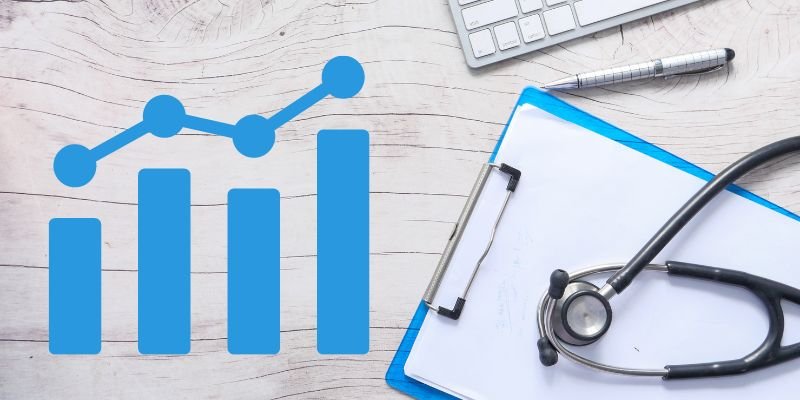Healthcare analytics is a rapidly growing field in the healthcare industry. With the rise of data-driven decision-making, it has become increasingly important for healthcare providers to have access to specialized tools that can help them analyze and interpret large amounts of medical data.
In this blog, we will provide an overview of tools for healthcare analytics and explain why they are so important.
We will also discuss how healthcare analytics can improve patient outcomes, as well as build vs buy considerations for healthcare analytics tools. Additionally, we have listed the top 5 providers of healthcare analytics tools like Arcadia, SPSS, Flatiron, Sisense, and Clarify Health.
Lastly, we will cover tools for healthcare data management and how they enable analytics with a special focus on using Flatiron for healthcare analytics.
Overview: Tools for Healthcare Analytics
Healthcare organizations benefit greatly from using a range of tools for healthcare analytics. Such tools help them obtain actionable insights that are valuable in making informed decisions and improving patient outcomes.
Clinical decision support systems enable doctors to make accurate diagnoses and treatment plans while data visualization helps identify trends in healthcare data. Predictive analytics offers an advantage by anticipating future healthcare needs and optimizing resource allocation while ensuring adherence to industry standards.
Furthermore, these analytic tools empower clinicians to gain real-time insights into patient care quality metrics and population health management. As a result of utilizing these technologies across the board of the healthcare providers’ spectrum achieves value-based care with lower costs.
Importance of Healthcare Analytics
Effective healthcare analytics has become a valuable resource for decision-makers in the healthcare sector.

Its ability to provide actionable insights into patient care has made it an indispensable tool for clinicians and healthcare organizations. As big data continues to expand through EHRs and other data sources, analytics tools like machine learning and predictive modeling offer real-time insights into population health management and quality care.
These analytic tools benefit stakeholders by providing value-based healthcare services while also reducing financial performance risks associated with health plans. The top players in the field include Sisense Fusion, Qlik, Flatiron, and many more.
What is Healthcare Analytics?
Healthcare Analytics is the use of data analysis tools to gain insights into healthcare systems and patient care. It involves various analytical techniques like predictive modeling and machine learning to draw conclusions from large datasets.
Healthcare analytics helps providers make informed decisions about patient care and resource allocation by analyzing key data points.
Specialized tools include electronic health records, clinical decision support systems, and population health management platforms.
Top Reasons Why Healthcare Analytics Is Important
Effective use of analytics tools offers several benefits to healthcare organizations. By leveraging big data sets through machine learning algorithms and predictive modeling, healthcare providers gain actionable insights into patient care and resource utilization.
Improved quality of care is possible through the identification of trends in patient outcomes.
Real-time dashboards offer clinicians access to key metrics that guide decision-making for value-based care delivery.
Lower costs are possible through the identification of operational inefficiencies and fraud prevention. The top players in the healthcare analytics tools market include Sisense Fusion and Qlik.
How Healthcare Analytics Improves Patient Outcomes
Data analysis tools used in the healthcare sector have given rise to the term ‘Healthcare Analytics.’
It helps identify trends and patterns within the Industry-Specific Analysis Solutions leading to better diagnosis and treatment.
Metrics like patient outcomes or utilization rates provide actionable insights for decision makers. The use of machine learning and predictive modeling in healthcare analytics has led to better patient engagement.
Providers now rely on real-time dashboards instead of paper-based records leading to improved operational efficiency.
These analytic tools have significantly reduced costs while providing value-based care.
Build vs Buy Considerations for Healthcare Analytics Tools
When it comes to deciding between building or buying healthcare analytics tools like customized dashboards or EHRs with machine learning capabilities for your organization’s metrics and financial performance analysis or population health management initiatives, there are several factors that stakeholders must consider carefully.

A proper cost-benefit analysis should help determine the potential return on investment of either option while balancing expenditures on custom applications versus pre-built analytic tools like Sisense Fusion and Qlik.
In-house development requires expertise in algorithms and natural language processing among other things.
The advantage of pre-built solutions like those from Flatiron lies in their ability to be modified as per customized needs within less time to market.
Factors to Consider Before Building or Buying
When deciding whether to build or buy healthcare analytics tools, there are several factors that need to be considered. Cost-benefit analysis is crucial to determine the potential return on investment for analytic tools.
It’s important to evaluate your organization’s resources and goals before making a decision. Building custom solutions can be expensive and time-consuming but can provide more flexibility and customization compared to buying pre-built solutions which may not meet all specific needs.
In addition to this, it’s essential to consider data security, scalability, and ease of use when choosing a solution.
By leveraging healthcare analytics tools like machine learning and big data analytics coupled with electronic health records (EHR) and clinical data, healthcare providers can gain actionable insights into metrics like patient outcomes and population health management while improving quality care delivery at lower costs.
Top 5 Providers of Healthcare Analytics Tools
In today’s data-driven world, utilizing advanced technology is essential for staying competitive in the healthcare industry. The top players in the healthcare analytics tools market include IBM Watson Health, which provides data analytics and artificial intelligence (AI) tools for healthcare providers.
Additionally, Health Catalyst offers a range of data management and analytics solutions for healthcare organizations while Cerner specializes in Electronic Health Record (EHR) systems that improve clinical outcomes.
McKesson provides a suite of analytics solutions, including predictive modeling, population health management, and real-time dashboards for pharmacies, hospitals, and other healthcare providers. Optum offers sophisticated analytic tools that help stakeholders make value-based decisions that lead to quality care at lower costs.
Arcadia
To make informed decisions in the healthcare industry, stakeholders need actionable insights from big data.
That is where analytic tools such as Arcadia come into play. This healthcare analytics software uses machine learning algorithms to provide real-time population health management while integrating with EHRs for easy access and analysis of metrics.
With its intuitive dashboard and user-friendly interface on top players like Sisense Fusion or Qlik BI Software Platforms for better visualization and faster discovery of new treatments or diseases ontology based on medical records hierarchy for mid-size to large companies.
In just seconds, clinicians can get comprehensive information that helps them deliver quality care and lower costs.
SPSS
Professionals in the healthcare industry use SPSS as one of the top players among analytic tools to gain actionable insights from big data.
Its features include data management, advanced algorithms for predictive analytics and real-time dashboards that help decision makers across the healthcare sector.
By utilizing SPSS within their enterprise data warehouses and electronic medical records systems, healthcare providers can streamline business processes and create custom applications that lead to better quality care in less time.
Flatiron
Flatiron is a major player among the top providers of Healthcare Analytics Tools. As a healthcare technology company that specializes in real-world data analytics for clinical research and personalized treatment decisions, Flatiron’s solutions deliver actionable insights to clinicians across the healthcare sector.
Their OncoCloud platform and software tools empower cancer centers and community oncology practices to manage patient care and workflow efficiency while identifying patterns in cancer care delivery.
Stakeholders benefit from Flatiron’s analytic tools as they enable decision-makers to make informed choices about new treatments.
Sisense
Sisense is one of the leading analytic tools in the healthcare industry. Providing users with actionable insights via dashboards and interactive visualizations while using predictive analytics to improve patient outcomes.
Data modeling along with natural language processing enables easy querying for clinicians which helps them to make better decisions in less time.
Sisense Fusion allows stakeholders to have real-time access to metrics which helps decision-makers in the healthcare sector to make informed decisions based on big data analysis. Lowering costs for health plans and helping mid-size to large companies improve quality care while reducing expenses.
Clarify Health
Clarify Health provides advanced healthcare analytics tools that help healthcare providers improve patient outcomes, reduce costs, and optimize their financial performance. With solutions ranging from predictive modeling to population health management, Clarify Health’s platform enables healthcare professionals to gain real-time insights into their clinical data.
By integrating EHRs and claims data from diverse sources using algorithms and natural language processing, Clarify Health delivers actionable insights that support value-based care across the healthcare sector.
Tools for Healthcare Data Management
The healthcare sector relies heavily on comprehensive data management solutions for actionable insights leading to improved patient care, lower costs, and streamlined operations.
Providers like Clarify Health offer electronic medical record (EMR) software that integrates real-time data entry applications with custom applications using analytics tools such as machine learning algorithms for predictive modeling to provide quality care.

Enterprise data warehouses provide an instant view of hierarchies in large companies with complex business processes while CDSS tools improve decision-making for healthcare professionals.
BI software such as Sisense Fusion provides dashboards with natural language processing capabilities that enable stakeholders to make informed decisions in less time
How Healthcare Data Management Enables Analytics
In the realm of healthcare analytics, effective data management is vital for better patient care. The process entails collecting and examining health-related information through specialized tools such as electronic health record (EHR) systems or clinical decision support systems.
These analytic tools provide clinicians with real-time actionable insights through metrics on things like population health management and dashboards.
When implemented correctly with big data analytics or machine learning algorithms across hierarchies within healthcare organizations it can lead to more informed decision-making in less time.
Using Flatiron for Healthcare Analytics
With Flatiron’s healthcare analytics tools that provide actionable insights from real-world patient data, healthcare organizations can improve patient care and decision-making for clinical trial research or drug development.
The platform includes features like predictive modeling and data visualization that offer a comprehensive solution for managing population health.
Clinicians benefit from instant entry applications that reduce the time spent on medical records while also providing custom applications tailored to specific business processes.
With top players like Sisense Fusion and Qlik using machine learning algorithms to analyze big data sets accurately in less time than traditional methods cost-effectively.
Choosing the Right Data Analysis Tool
10 Data Analysis Tools to Transform Your Business in 2023
Conclusion
In conclusion, specialized tools for healthcare analytics are crucial for the industry. They enable healthcare providers to make informed decisions that improve patient outcomes and reduce costs. With so many options available on the market, it can be challenging to choose the right one.
You must consider factors such as your budget, data management capabilities, and the specific needs of your organization before deciding whether to build or buy. Our blog provides an in-depth analysis of the top five healthcare analytics providers and their features that will help you make an informed decision.



